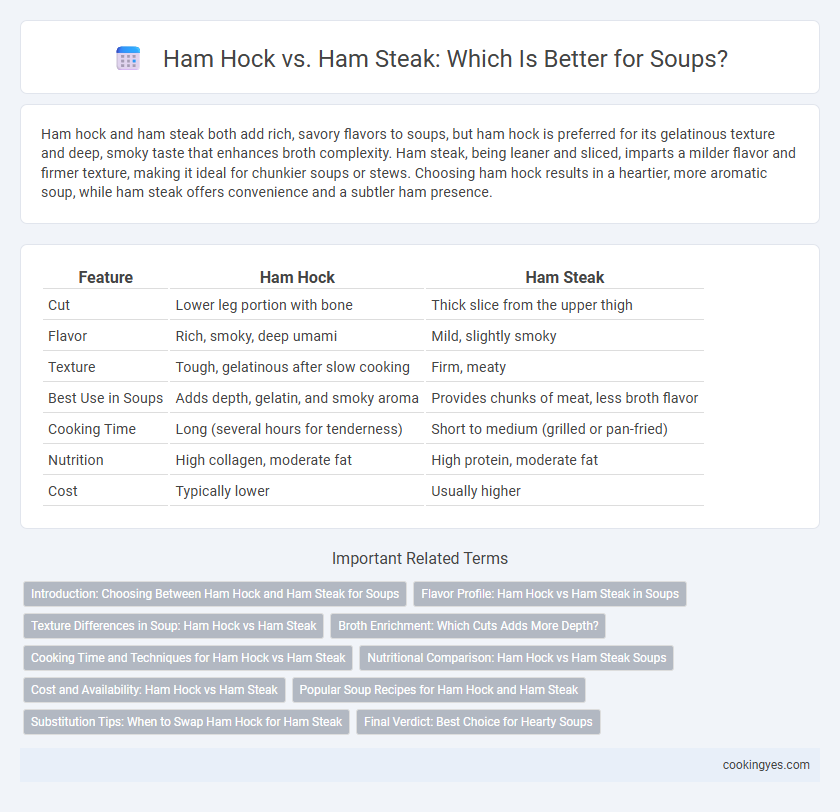Ham hock and ham steak both add rich, savory flavors to soups, but ham hock is preferred for its gelatinous texture and deep, smoky taste that enhances broth complexity. Ham steak, being leaner and sliced, imparts a milder flavor and firmer texture, making it ideal for chunkier soups or stews. Choosing ham hock results in a heartier, more aromatic soup, while ham steak offers convenience and a subtler ham presence.
Table of Comparison
| Feature | Ham Hock | Ham Steak |
|---|---|---|
| Cut | Lower leg portion with bone | Thick slice from the upper thigh |
| Flavor | Rich, smoky, deep umami | Mild, slightly smoky |
| Texture | Tough, gelatinous after slow cooking | Firm, meaty |
| Best Use in Soups | Adds depth, gelatin, and smoky aroma | Provides chunks of meat, less broth flavor |
| Cooking Time | Long (several hours for tenderness) | Short to medium (grilled or pan-fried) |
| Nutrition | High collagen, moderate fat | High protein, moderate fat |
| Cost | Typically lower | Usually higher |
Introduction: Choosing Between Ham Hock and Ham Steak for Soups
Ham hock delivers rich, smoky flavor and gelatinous texture ideal for hearty soups, enriching broths with depth and body. Ham steak offers tender, lean meat that cooks quickly, providing a meatier bite without overwhelming the soup's base. Selecting between ham hock and ham steak hinges on desired broth richness versus meat texture and cooking time.
Flavor Profile: Ham Hock vs Ham Steak in Soups
Ham hock imparts a rich, smoky, and deeply savory flavor to soups due to its collagen-rich meat and bone marrow, which release gelatin and enhance broth thickness. In contrast, ham steak offers a milder, saltier taste with a firmer texture, contributing less gelatin but a pronounced cured pork flavor. Using ham hock results in a more robust, complex broth, while ham steak provides a straightforward, meaty note ideal for lighter soup bases.
Texture Differences in Soup: Ham Hock vs Ham Steak
Ham hock imparts a rich, gelatinous texture to soups due to its high collagen content, which breaks down slowly during cooking, creating a silky, thick broth. In contrast, ham steak provides a firmer, meatier bite with less collagen, resulting in a clearer, less viscous soup texture. Choosing ham hock enhances mouthfeel and body, while ham steak emphasizes chewiness and distinct meat pieces in the soup.
Broth Enrichment: Which Cuts Adds More Depth?
Ham hock infuses soups with rich, gelatinous broth due to its high collagen content and connective tissues, creating a deeply savory and hearty flavor profile. Ham steak, being leaner with less connective tissue, produces a lighter broth that adds mild smoky undertones but lacks the same depth and body. For maximum broth enrichment and complex umami, ham hock is the superior choice in soup preparation.
Cooking Time and Techniques for Ham Hock vs Ham Steak
Ham hock requires longer cooking times, typically simmering for 2 to 3 hours to break down tough connective tissues and release rich, smoky flavors ideal for hearty soups. Ham steak cooks faster, usually 10 to 15 minutes, and is best seared or lightly boiled, providing a more tender texture but less depth of flavor for slow-simmered dishes. Choosing ham hock enhances broth complexity through slow braising, while ham steak suits quick soups needing immediate savory accents.
Nutritional Comparison: Ham Hock vs Ham Steak Soups
Ham hock provides a richer, gelatinous broth with higher collagen content, enhancing soup texture and offering joint health benefits. Ham steak contains more protein and less fat, making it a leaner option with a stronger meaty flavor that boosts soup nutrition and satiety. Both cuts contribute essential vitamins and minerals such as B vitamins, zinc, and iron but differ in fat content and gelatin levels, influencing soup consistency and nutritional profile.
Cost and Availability: Ham Hock vs Ham Steak
Ham hocks are generally more affordable and widely available, especially in grocery stores that cater to traditional or budget-conscious cooking. Ham steaks, while pricier, offer convenience and quicker preparation but may be less common in some markets. For soups, choosing ham hock provides a cost-effective option with rich flavor extraction, whereas ham steak delivers a leaner taste profile at a higher expense.
Popular Soup Recipes for Ham Hock and Ham Steak
Ham hock is ideal for hearty soups like split pea and navy bean due to its rich, smoky flavor and connective tissue that adds depth and gelatin to the broth. Ham steak works well in quicker soups such as ham and potato or vegetable soups, providing tender, bite-sized pieces without long simmering. Popular soup recipes using ham hock include traditional pea soup and collard green soup, while ham steak is frequently featured in chowders and creamy ham and corn soups.
Substitution Tips: When to Swap Ham Hock for Ham Steak
Ham hock provides rich, gelatinous flavor ideal for slow-simmered soups, while ham steak offers a leaner, more tender texture suitable for quicker cooking. Substitute ham steak for ham hock when time is limited, but expect less broth depth and collagen. For best results, add extra seasoning or simmer ham steak longer to extract sufficient flavor in your soup recipes.
Final Verdict: Best Choice for Hearty Soups
Ham hock delivers rich, smoky flavor and gelatinous texture ideal for hearty soups, infusing broth with depth and body. Ham steak provides a leaner, meatier bite but less collagen for thickening, making it better suited for chunkier, less broth-based recipes. For robust, flavorful soups, ham hock remains the superior choice due to its ability to create a well-rounded, savory broth.
Ham hock vs Ham steak for soups Infographic

 cookingyes.com
cookingyes.com